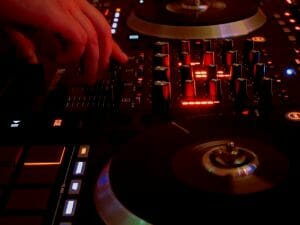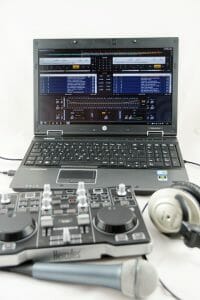Becoming a DJ, How To Start
There’s no easy and exact way to becoming a DJ. Just like any other professions, DJ-ing is a long path of successes and failures, which has to be taken step by step if one wishes to become a great professional like any other career, DJ-ing should start with a great passion for music and the entertainment industry. Getting an education is also mandatory – you can either sign up for specific courses or learn by yourself, from the internet or other alternative sources. You will also have to invest in the necessary equipment, which we’ll list below. Last but not least, an essential aspect you need to pay attention to is making connections – make sure your local clubs and the professional DJs from your area know you and could help you start a contract when you’re ready.
Let’s get through the primary steps which bring one to the career of a DJ:
1. Passion for music and the entertainment industry
 While you may not need specific music theory knowledge to enter this field, you still need to have a sense of rhythm and harmony. If you’re a music enthusiast, you’re probably already ready to take on the DJ trade.
While you may not need specific music theory knowledge to enter this field, you still need to have a sense of rhythm and harmony. If you’re a music enthusiast, you’re probably already ready to take on the DJ trade.
You also need to pay attention to the beat of the music rather than on the lyrics. Of course, the lyrics are the most important aspect of a song, but if you’re going to become a DJ, you need to start paying attention to the rhythm of the beats as well. As club music is oriented towards making the crowd dance, you need to develop the ability to feel the most engaging beats and incorporate them into a mix.
2. Researching the trade
Before you decide on making DJ-ing your permanent job, you need to make a lot of research on numerous aspects. Even for a beginner, it’s essential to know about the main equipment every DJ needs to have, how much can your earn, and if you need any legal licensing to become a professional. Don’t forget about this last aspect – while it might seem boring and tedious to go through the law, you don’t want to end up caught earning money illegally. You also want to make sure that the music you want to use is legally purchased and not pirated, as this may create problems when you least expect.
Besides that, you need to research about the equipment used – what is the difference between controllers and mixers, why do DJs need turntables, what is a DJ software and how does it work, which headphones are recommended for DJ use, and many other technical details.
3. Getting an education
This is one point where opinions tend to differ – some may state aloud that you cannot become a DJ without a professional course diploma, and some will say that you’ll be just as good self-trained. It’s better to communicate with local DJs first – some states, or even places, require that the DJs whom they work with have graduated from some specialized institution. Getting a professional education would increase your chances of being hired, but will not replace musical creativity and personal charisma. On the other hand, some places may be perfectly OK with hiring self-taught people based solely on their talent – as an opening act to famous DJs first, and as a permanent one later on.
If you decide to get a professional education, you’ll need to start off by searching if there are any schools offering DJ courses in your area. From there, the school will usually instruct you and provide you all the details as to what you need to bring, how much is the tuition, etc… Usually, they will require you bring your laptop with a DJ software on it, your playlist and a pair of high quality headphones.
The teachers at these schools will gladly teach you the basics of mixing, vinyl scratching, looping, using the software, etc… Make sure to check if the school of your choice offers a graduation diploma, and how long does it take for them to issue it. Some schools delay the diploma offering for over one year, which is not always the best if you want to find a job as soon as possible.
If there are no such schools in your area, or you just don’t have the funds to spend on the tuition fee, you could get a professional DJ to give you particular lessons. If you have a friend or family member, who happens to be a DJ, the better! You can set your price, and usually get more knowledge that from a collective course. You can also “quit” anytime you feel like you learned enough.
Last but not least, you can try and get an education of your own. This won’t cost you a cent, and it would be a sin to say that you cannot succeed. With so many photo and video tutorials online, as well as full-fledged video courses, you can get the same education as you would in a DJ school.
4. Invest in equipment
 If you haven’t already gathered the basics by this point, it’s time you invested in several essential that any DJ needs to own. These include:
If you haven’t already gathered the basics by this point, it’s time you invested in several essential that any DJ needs to own. These include:
1. A performance laptop (many DJs use Mac as they are oriented more towards creators, but user-oriented ones like Windows will also work just fine)
2. Software such as Serato, Traktor, Ableton Live, Mixxx, or anything else you’re used to.
3. A pair of turntables.
4. Professional DJ headphones
5. A mixer
When shopping for these essentials, it’s critical to keep your budget in mind and not go over your personal needs. Sometimes, you might be tempted to invest in the latest Pioneer controller, but it might end up having too many features that you can’t even use when mixing in a small location and for a rather small crowd.
5. Build a portfolio
Before you start looking for a real job as a DJ, you need to have at least a couple of mixes to present as a sample of your work and style. After you’ve received the basic education, it will probably be easy to do, record, and upload to a digital platform. You can use MixCrate or SoundCloud to publish your mixes online and show them as your portfolio whenever you’re applying for a job.
6. Get an “internship”
As you can see, DJ-ing is starting to look more and more like any other profession – first, you need to get and education and graduate, and then you need to start looking for internship options that would offer you some experience of the real world. At this point, you should start getting in contact with the local clubs and dedicated DJs, which will have to take you in for an internship. At least one of them will accept your offer, but to increase your chances, you will also need to showcase some of your work. You can showcase your work by uploading it to different online music platforms. The most common one is SoundCloud, but there’s also MixCrate and other similar DJ-oriented websites. These will offer you all the tools (basically, an Upload button) to make your music known around the web.
7. Market yourself
Don’t forget about self-promotion. It’s one of the easiest and most rewarding things you can do. As the internet is such a populated space today, and social media are bustling with people’s attention, it will be extremely easy to promote your music – first among your friends and family, than among the club’s permanent clients, and then to bigger and bigger audiences.
At this point, it’s a good idea to create “business” pages on social media and target your audience – it will be much easier to get contracts and invitations this way.
This would be all the steps you need to go through when going for a DJ career. Of course, everyone has their path that they should walk, but these should give you an insight on the main steps every beginner DJ goes through.
